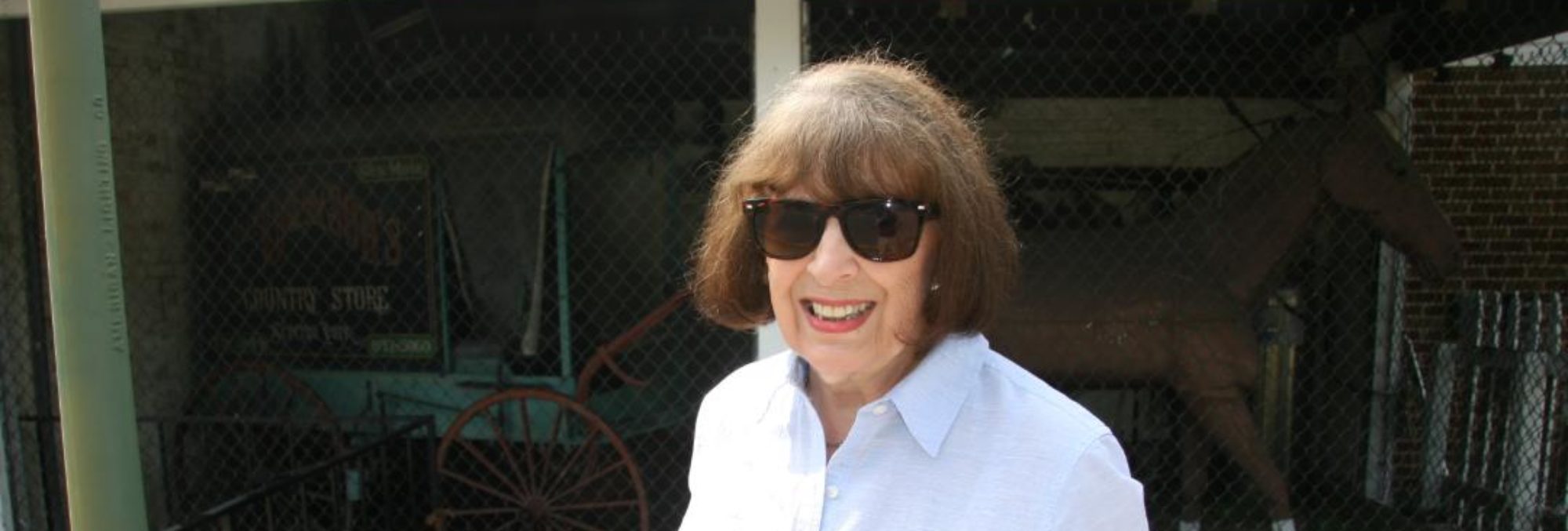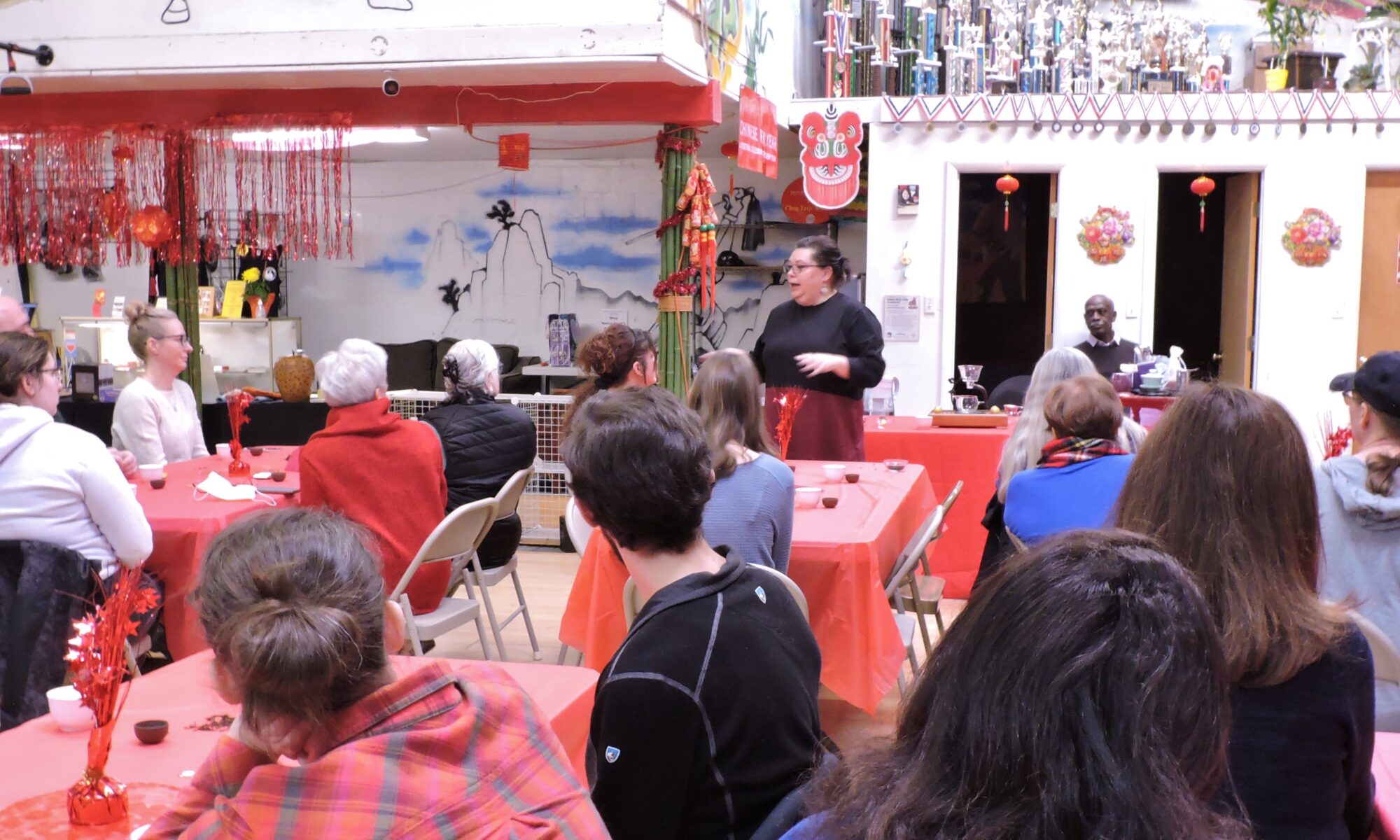AROUND THE PARK AGAIN by Sharon Lee Tegler

Brought to you by Jing Ying Institute of Kung Fu & Tai Chi
What could be more uplifting on a rainy Sunday afternoon in January than to attend a Tea Tasting by well-known tea expert Lynayn Mielke hosted by Jing Ying Institute of Kung Fu & Tai Chi.
Mielke, owner of The Well Infused Life at 915 Bayridge Avenue in Annapolis, has literally traveled the world in her quest for knowledge about different teas and their effects on the human body and spirit. Introduced to the audience by Jing Ying Institute owner Nancy Greer, Mielke’s expressive presentation about the art of tea tasting immediately captured the audience’s attention and imagination.
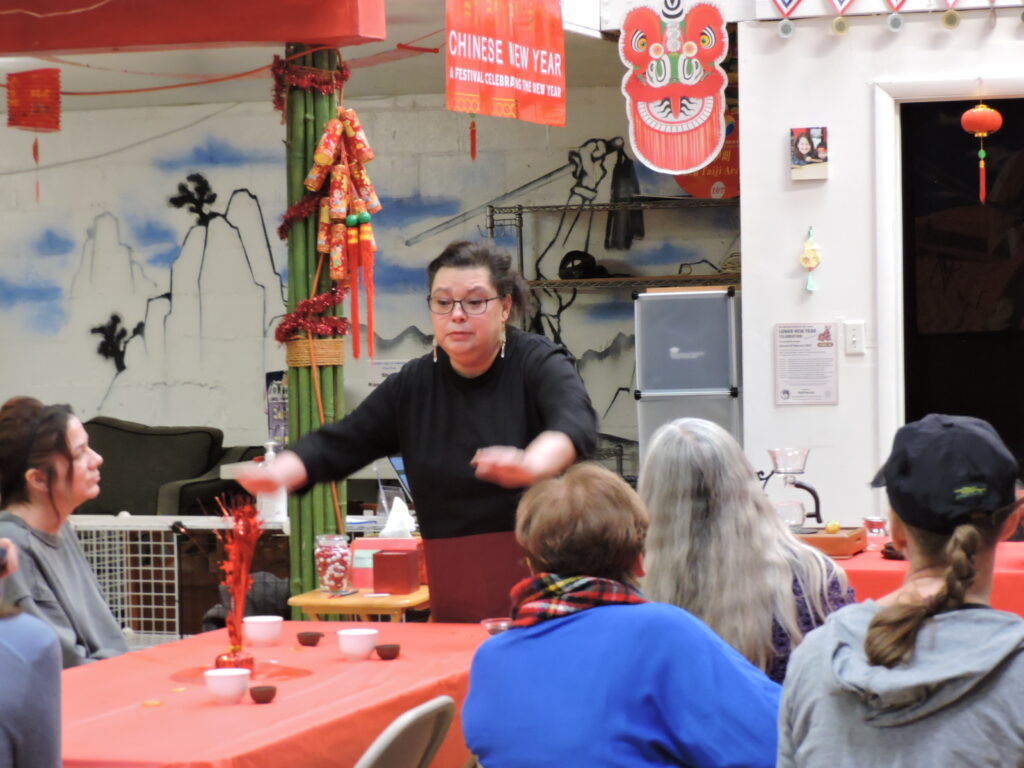
Unlike “going to tea” at a hotel or fancy restaurant where scones, clotted cream and finger sandwiches are on the agenda, a “tea tasting” is just that – a tasting and comparison of various teas. Mielke’s guests would be tasting and comparing three different Chinese black teas during the afternoon and discovering the subtleties of each.
It’s well documented that drinking tea with friends encourages everyone “be present” in the moment – a practice that is greatly beneficial to one’s health. Bearing that in mind, Mielke encouraged attendees to introduce themselves to everyone else at their table.
Her own passion for tea began early.
“I’ve loved drinking tea since I was five years old and having tea with my grandparents,” she said.
It wasn’t until she was an adult acupuncturist, however, that she rediscovered and refined her connection with the beverage. While studying with Professor J. R. Worsley, the father of Five Element Acupuncture, she learned of the connections between acupuncture and herbs. Though intrigued, she chose not include herbal therapy in her own practice. Instead, she delved further into the medicinal, meditative, and spiritual benefits of tea and began recommending it to her patients.
Prior to the actual tasting, Mielke noted that there were two cups at each place at the table. The white cups, she explained, were for drinking the tea and observing the different aromas, colors and flavors of the three varieties. The tiny clay cups at each place were gifts from her to her guests to take home with them. No longer made, the little cups were 20 years old and made from Yixing Clay found only in the Yixing region of Central China. They were originally used in the brewing or tasting process. One of many anecdotes the world traveler shared involved watching those clay cups being made by artisans who were women during one of her visits to China.
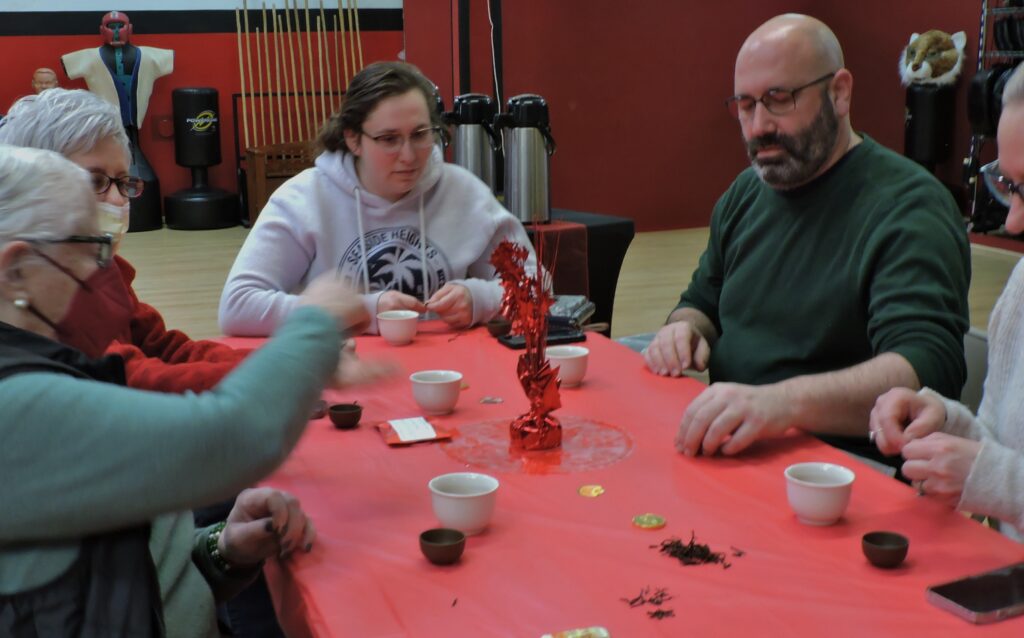
Soon, she pointed to the three teas being tasted which were neatly arranged on a table at the front of the room. There were examples of the dry tea leaves of each as well as the wet, or infused, versions of each.
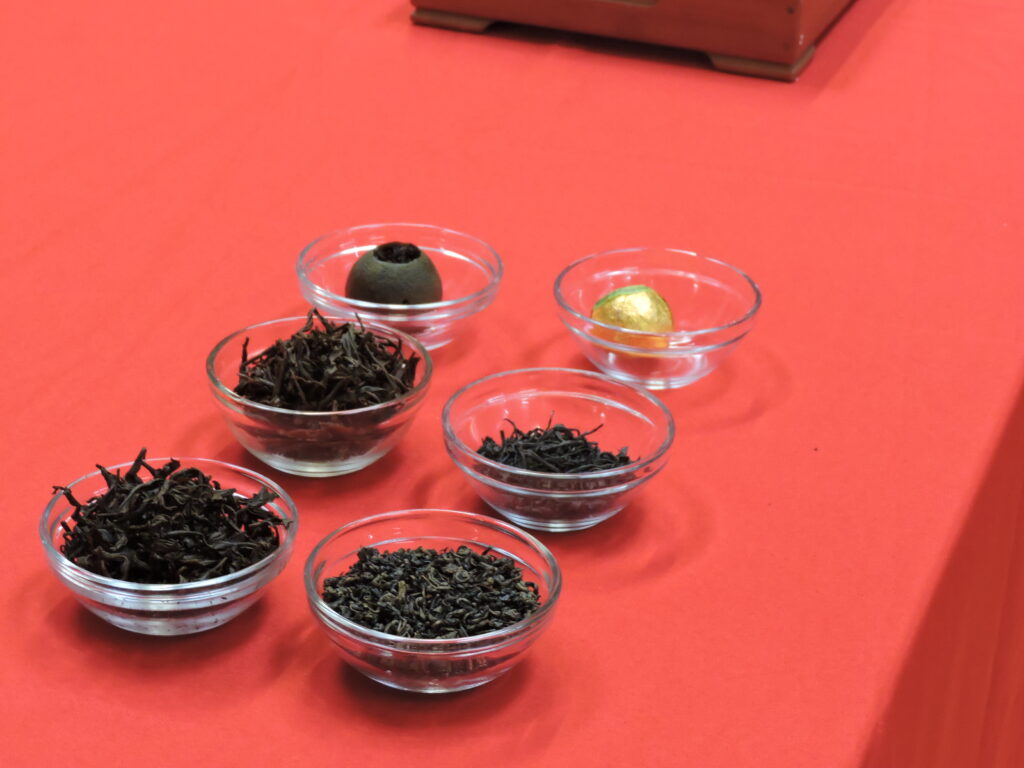
Mielke explained that there are two main varieties of tea plants. Camelia sinensis is grown only in China and is the source for black teas, green teas, white teas, pu-ehr (also spelled puehr) teas, oolong teas, and yellow teas. Of those varieties, only black teas and pu-ehr teas are fermented. Pu-ehr teas can be loose leaf varieties or, more often, you’ll find them with the leaves compressed into small shapes.
Camelia sinensis assamica tea plants are grown in India with two main varieties of strong, large leaved black teas, Assam and Darjeeling.
Examining the examples of dry and wet leaves of each tea being passed around, the guests observed how the tea leaves swelled in size once infused.
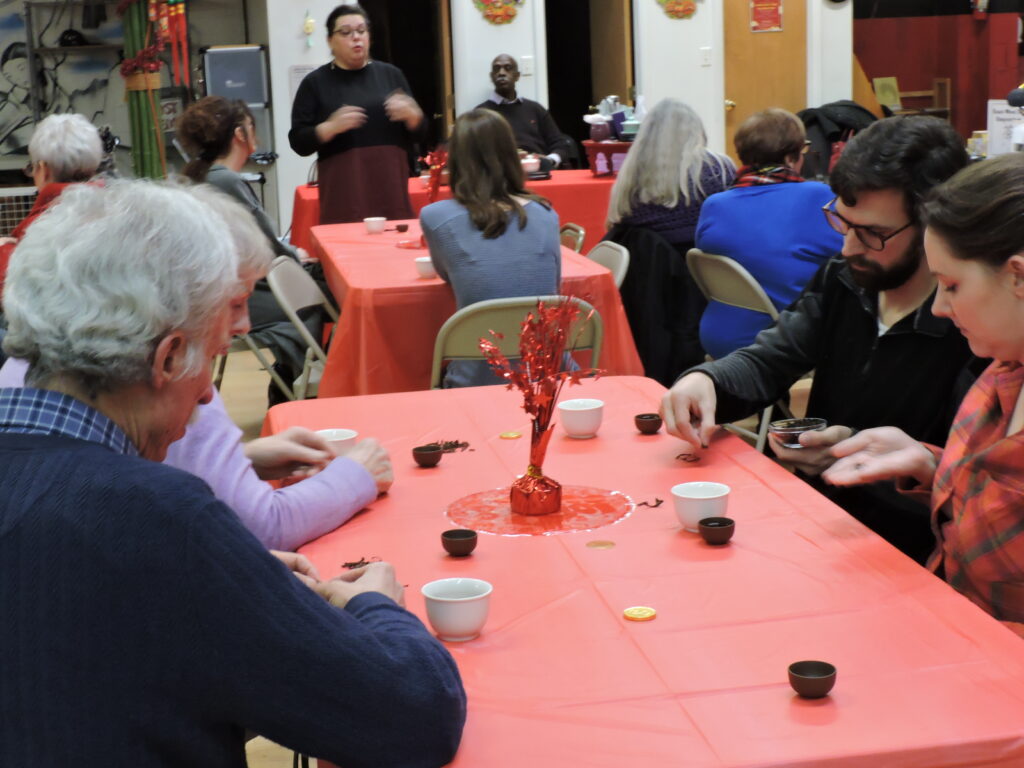
Mielke had earlier brewed plentiful amounts of all three of the featured teas and stored them at the proper temperature in stainless steel air pots for everyone to taste. She invited one or two guests from each table to form a line at the air pot furthest left and sample the first tea – a Gong Fu Cha. To honor the tradition of serving others as part of the tasting ritual, each person carried two cups to fill.
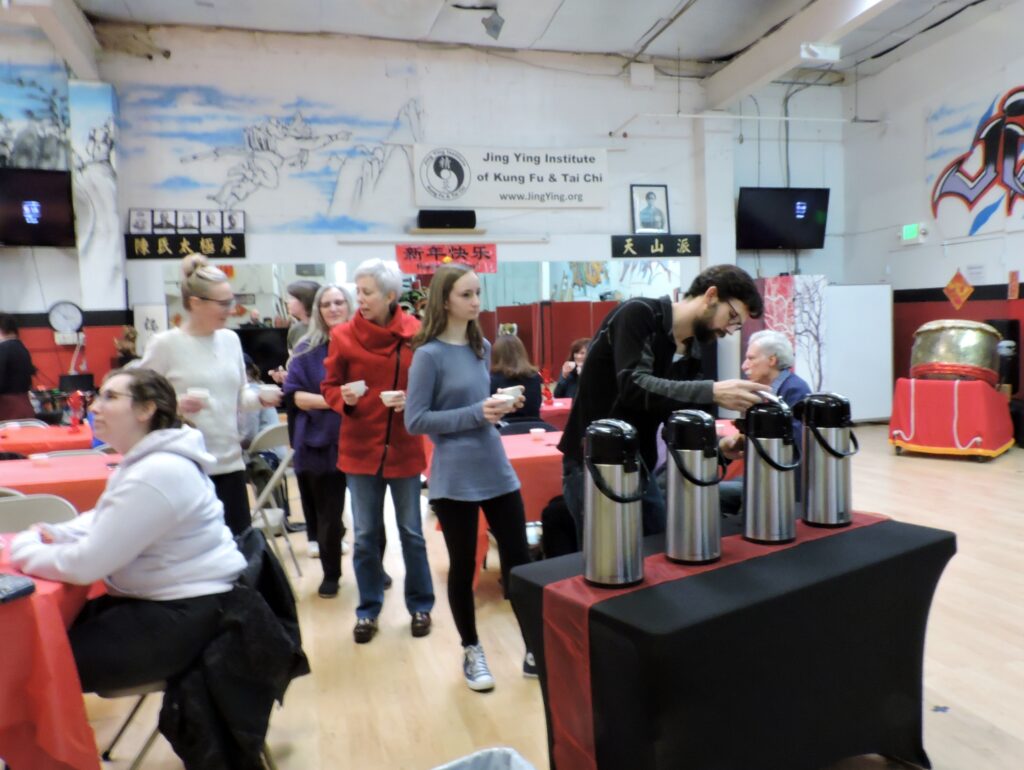
Headed by James Kluh, a line of eight people formed. A little bit later, black Labrador guide dog Parker was only too happy to accompany his mistress Wendi Ng to the air pots once the line dwindled.
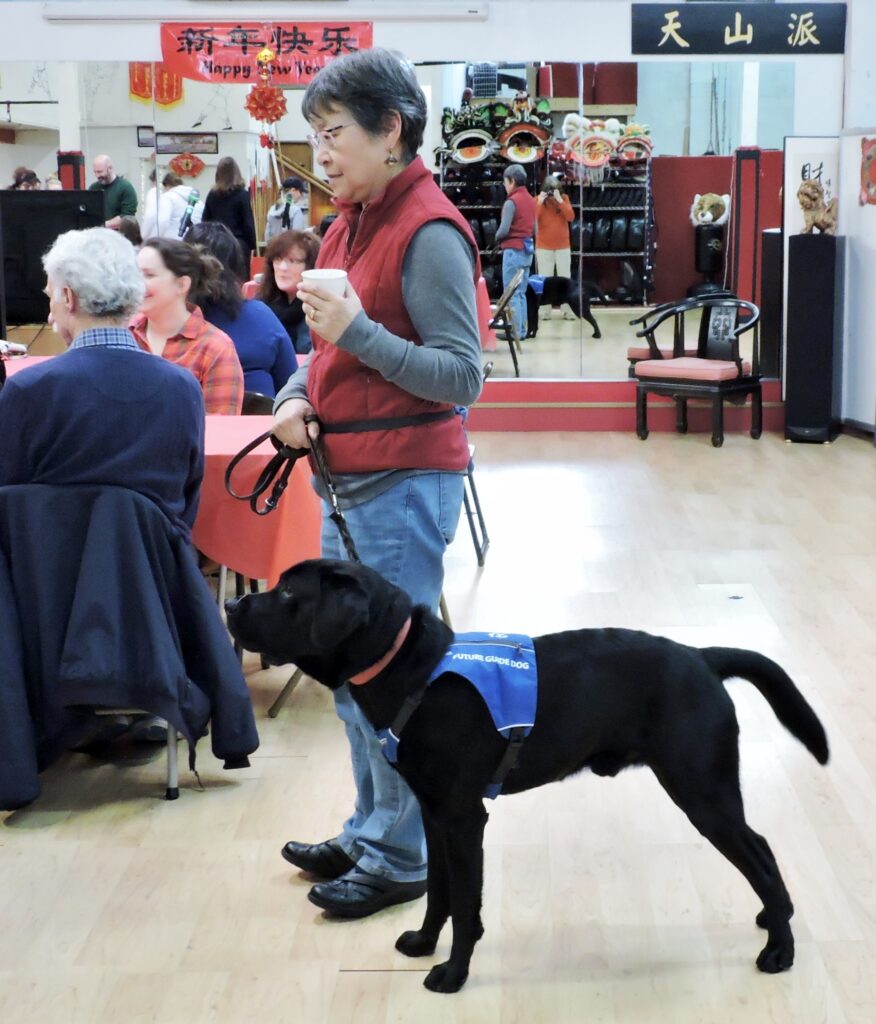
Ng, whose popular calligraphy classes are hosted by Jing Ying Institute, said she is raising Parker while he’s training to become a Guiding Eyes For The Blind guide dog. He’ll be going back to Guiding Eyes in mid-April for testing to assure he’d make a good guide dog. If all’s well, he’ll receive a good deal of further training before being matched with someone with vision loss.
Mielke, meanwhile, asked attendees to cradle their cups of tea and breathe in the aroma. Surprisingly, she emphasized that it was a perfectly acceptable practice to slurp one’s tea in order to aerate the beverage over the tongue thereby enhancing its taste.
After savoring the Gong Fu Cha, the second tasting of Black Gunpowder Tea from Fujian was introduced. Attendees once more filled multiple cups of tea from the air pots. Among other attributes, the leaves of Black Gunpowder Tea are broad and strong and capable of being reinfused a second time. Those tasting the beverage described it as having a smoky taste.
Having acquainted her audience with two of the three types of tea, Mielke introduced them to a range of tea accessories called Gai wans which are basically small pots that brew a single serving of tea. She also displayed a magnetic tea infuser that she later used to show the audience what a brewing of the final tea, a pu-erh, looks like.
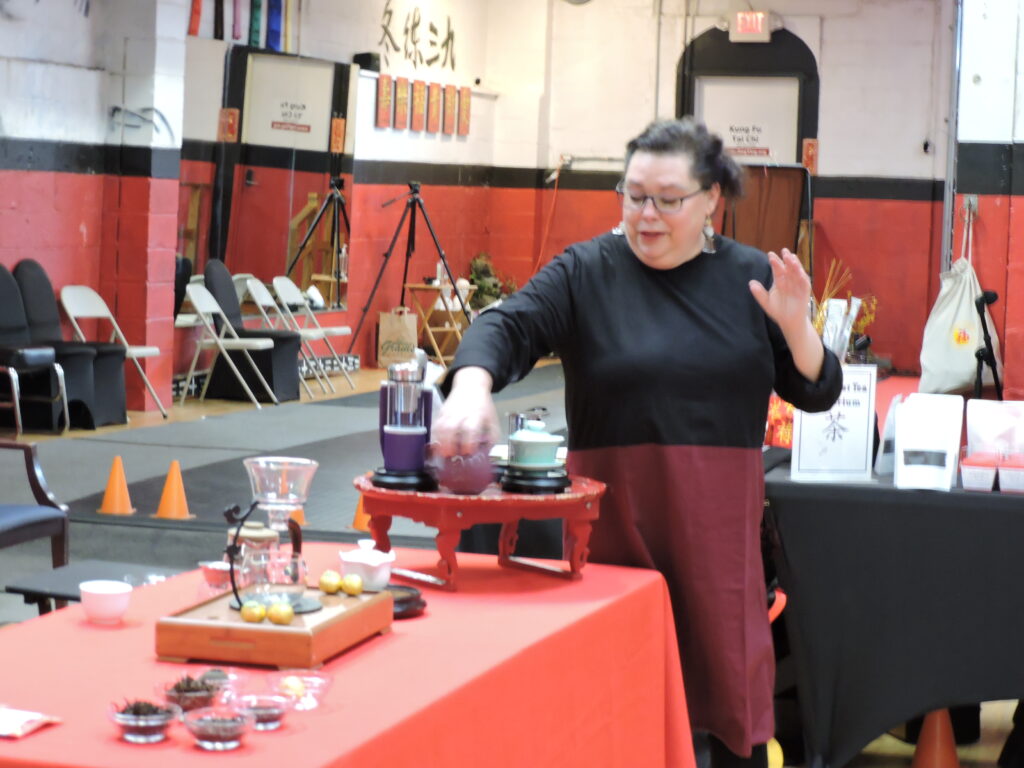
Pu-erhs are aged black teas that are fermented allowing microbials to develop that are beneficial to wellness and longevity. The one she chose to feature for the final tasting was a Mandarin Orange Pu-erh with strong hints of roses and chocolate.
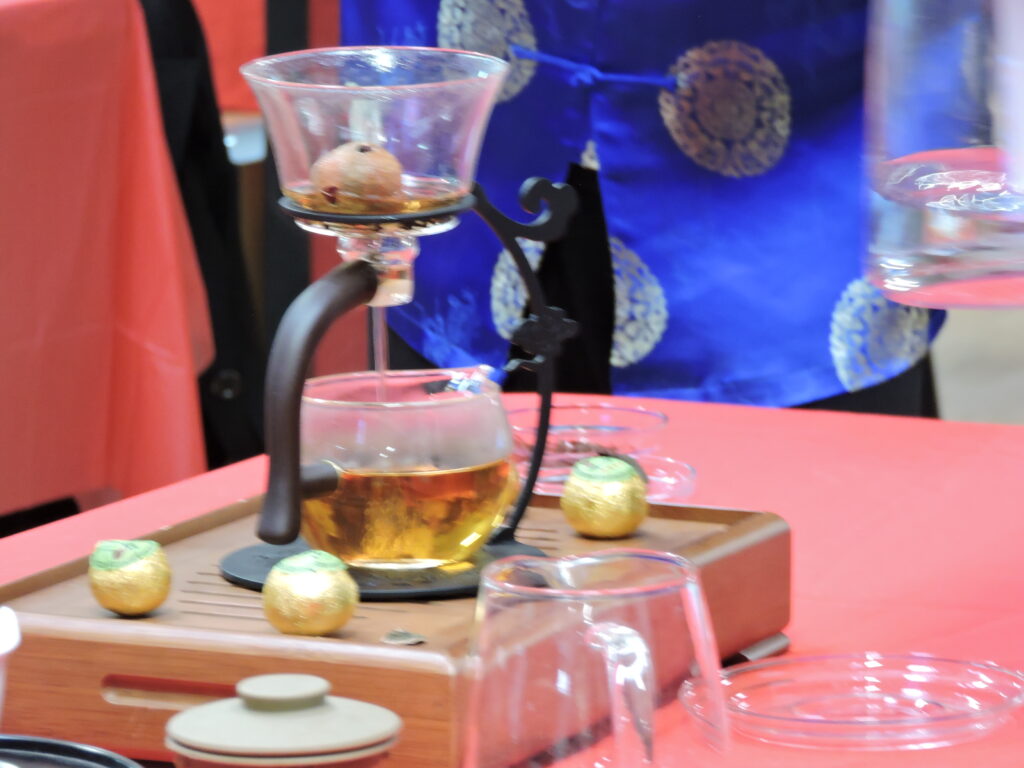
Many attendees said they liked this tea best as the aromas and flavors of rose and chocolate really came through. Though the tasting ended with final cups of tea, the event was not yet over.
Questions were taken and answered by Mielke and helpful tea tips were given. Among them we learned that teas can be kept for two years. However, one should not refrigerate tea leaves. (You can brew the tea leaves and allow the tea to sit out overnight for use in the morning.) Above all, don’t ever microwave tea which destroys the microbials as well as the structure of the tea.
Just as the event was winding down, Lynayn Mielke took a moment to pose for photos with her helpful companion Rodell Middleton and hosts Nancy and Billy Greer.
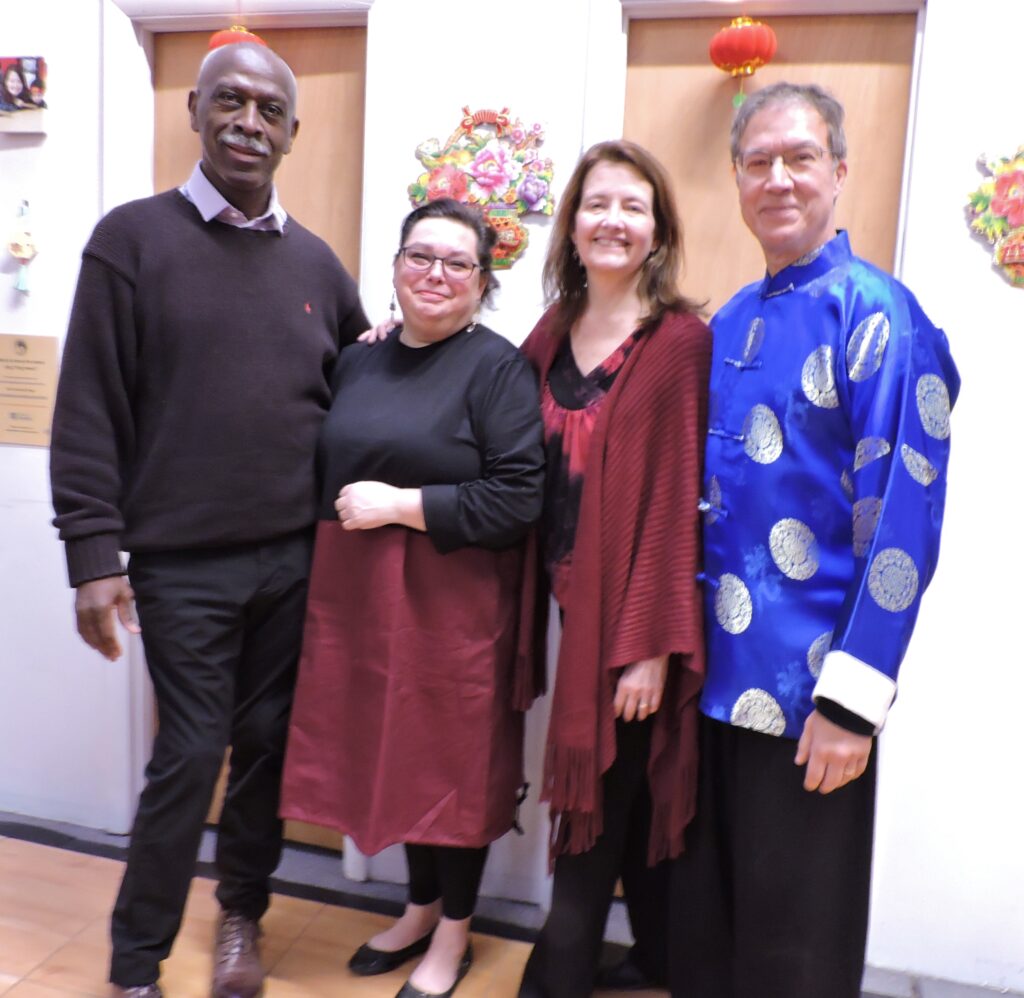
Afterward, people browsed the Silent Auction table set up by Jing Ying Institute to raise funds for the Alzheimer’s Association which provides Alzheimer’s care, support and research. Others flocked to a table of teas and tea accessories available for purchase from Mielke’s business, The Well-Infused Life. (Years ago, she recommended teas to her acupuncture clients and soon began selling them. The sign on the table for the East West Tea Emporium is a reminder of the original tea business she launched years ago with her mother.)
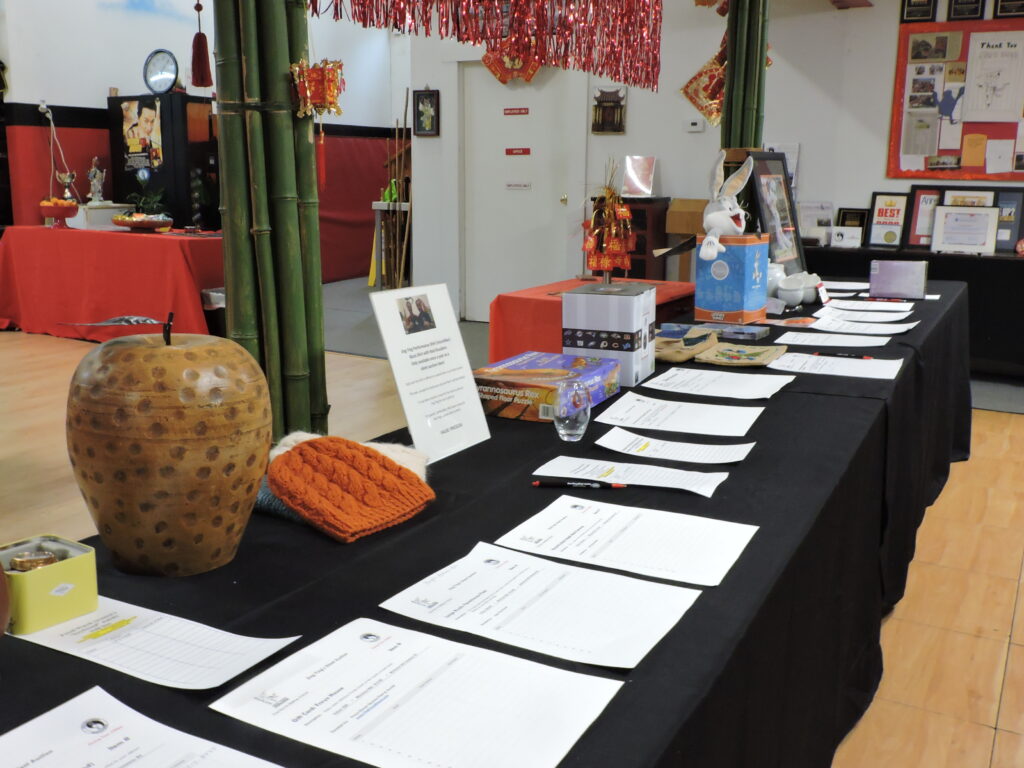
Jing Ying’s Silent Auction Table was created to raise funds for the Alzheimer’s Association. 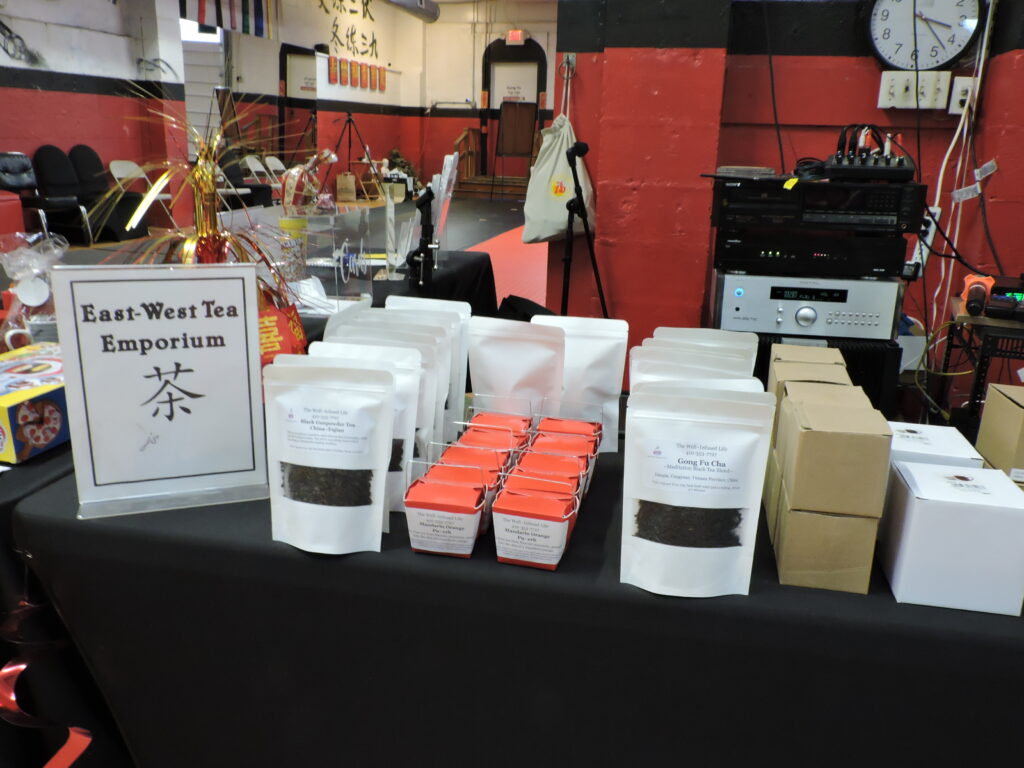
A fine selection of teas and tea accessories from The Well-Infused Life was available for purchase.
As one might imagine, there was a long line of willing customers for a variety of Well-Infused Life products for sale. To learn more about Lynayn Mielke and The Well-Infused Life, visit Lynayn Mielke | Facebook.
Orphan Grain Train’s “Light Up Ukraine” Drive still going strong
We have a follow-up to our earlier news about Orphan Grain Train’s “Light Up Ukraine” campaign. The effort has been a huge success! To date the organization has collected over $85,000 and money is still coming in. A total of 3,500 lights have been sent to Ukraine so far, with many more on order. OGT has collected enough money to purchase over 11,000 lights. Light Up Ukraine committee chair Elfe Eberle would like to pass on her thanks to everyone who helped OGT in giving LIGHT and HOPE to the people of Ukraine.
The Around The Park Again column is brought to you by Jing Ying Institute of Kung Fu and Tai Chi at 1195 Baltimore Annapolis Blvd. – For over two decades providing martial arts training that improves cardiovascular health, strength and flexibility while reducing stress. January 28 marked the start of Jing Ying Institute’s month-long silent auction fundraiser for the Alzheimer’s Association

